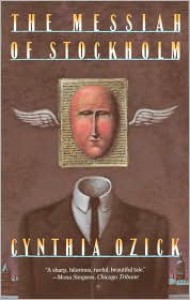 This book is not as good as The Shawl. Part of the reason is that there doesn't seem to be a sense of place. It feels like more of a setting for convince than an actually place.What Ozick seems to be concerned with here, besides creative power, is the effect of a past you can't quite remember. Lars surived the war, but he doesn't know his father and he has no real idea who his father is. He is a refugee, but where does he really belong? It isn't guilt; it's a lack of connection. This might explain the lack of place, but it is a strange lack of place.It's the lack of roots that make this tale compelling.
This book is not as good as The Shawl. Part of the reason is that there doesn't seem to be a sense of place. It feels like more of a setting for convince than an actually place.What Ozick seems to be concerned with here, besides creative power, is the effect of a past you can't quite remember. Lars surived the war, but he doesn't know his father and he has no real idea who his father is. He is a refugee, but where does he really belong? It isn't guilt; it's a lack of connection. This might explain the lack of place, but it is a strange lack of place.It's the lack of roots that make this tale compelling.
Chris' Fish Place
Thoughts on things, mostly books.
 This book is not as good as The Shawl. Part of the reason is that there doesn't seem to be a sense of place. It feels like more of a setting for convince than an actually place.What Ozick seems to be concerned with here, besides creative power, is the effect of a past you can't quite remember. Lars surived the war, but he doesn't know his father and he has no real idea who his father is. He is a refugee, but where does he really belong? It isn't guilt; it's a lack of connection. This might explain the lack of place, but it is a strange lack of place.It's the lack of roots that make this tale compelling.
This book is not as good as The Shawl. Part of the reason is that there doesn't seem to be a sense of place. It feels like more of a setting for convince than an actually place.What Ozick seems to be concerned with here, besides creative power, is the effect of a past you can't quite remember. Lars surived the war, but he doesn't know his father and he has no real idea who his father is. He is a refugee, but where does he really belong? It isn't guilt; it's a lack of connection. This might explain the lack of place, but it is a strange lack of place.It's the lack of roots that make this tale compelling.








